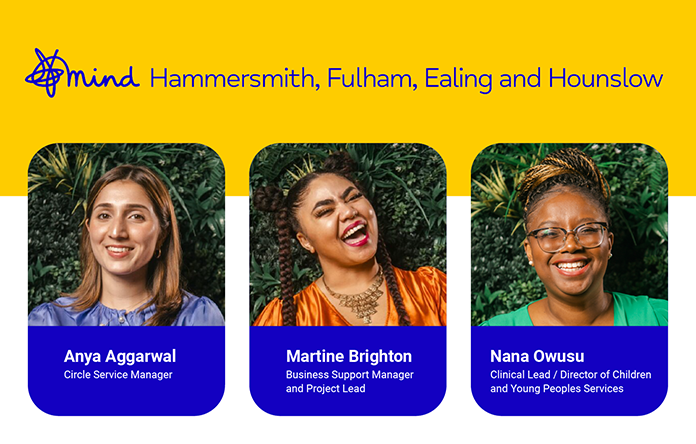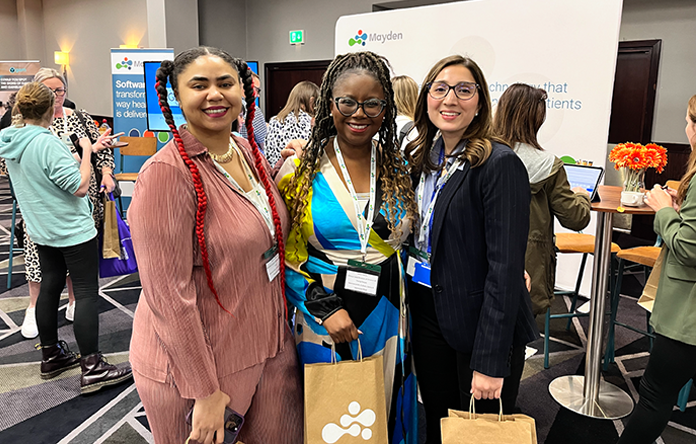
Hammersmith Fulham Ealing and Hounslow Mind (HFEH Mind) is a London based charity working hard to improve mental health services and outcomes for children and young people in schools and communities across West London.
We recently welcomed Anya Aggarwal, Circle Service Manager, Nana Owusu, Clinical Lead and Martine Brighton, Business Support Manager & Project Lead to share their experiences at Open Forum’s “Improving access to effective support” conference in London.
They outlined how they have utilised data from iaptus to mindfully develop and improve mental health services and outcomes for children and young people; touching on effective clinical management within the voluntary sector to enhance and improve collaborative working with NHS and statutory services.
The charity chose iaptus to support the growth of their range of mental health services. Since implementation, they have been able to use the data within iaptus to identify trends and themes, guiding them to improve their services for the children and young people they work with and report data back to the NHS.
How does HFEH Mind utilise data and technology to design and improve mental health services for children and young people?

The team described how, using data insights from iaptus, they have developed innovations in their CYPMH interventions. They saw that the number of weeks that young people were staying in treatment was increasing and more were coming back for repeat treatment. HFEH Mind wanted to offer clinically safe CBT self-guided tools to young people. They chose the Wysa app and are now able to refer children to the app and pull data back into iaptus, helping therapists to monitor progress, review clinical notes and any risk alerts.
Integrating Wysa and iaptus was a key moment for us. The support from Mayden and Wysa made it incredibly seamless to integrate into our service. The great thing about Wysa is that it’s completely interoperable with iaptus. We, as practitioners, are able to login to iaptus and review all clinical notes and conversations that happen in the app. Anya Aggarwal, Circle Service Manager, HFEH Mind
More recently, HFEH Mind introduced The Circle ‘crisis cafe’ drop-in hub in Ealing for crisis early intervention after seeing an increase in the number of children and young people presenting in mental health crisis in their area. Their team has been able to mindfully develop these services, working collaboratively with young people to create a welcoming drop-in space where those experiencing crisis can get immediate support. HFEH Mind uses iaptus, to offer effective clinical management and make referrals on to specialist NHS services where needed.
HFEH Mind has also been able to use gender and ethnicity data in iaptus to see where referrals to their services are not representative of the diversity in their local populations. This helped to guide their work to address health inequalities and their projects to engage underrepresented groups.
How has HFEH Mind improved collaborative working with NHS and statutory services?
One of their biggest aims was making the significant shift to providing statutory services with the introduction of the Mental Health Support Team (MHST) service.
They outlined that the data they are able to manage in iaptus and report for their NHS contracts, provides a clear audit trail and allows them to bridge the gap between voluntary and NHS services in their area.
We have a lot of reporting requirements and answer to a lot of commissioners. We have to do monthly MHSDS submissions, quarterly commissioners reports, internal performance monitoring, and a lot of different ad hoc reports. iaptus has a great report portal, where you can easily pull out standardised reports. Working with the Mayden team, we have been able to develop our own bespoke dashboard report within iaptus, designed specifically for our service and our reporting requirements. Martine Brighton, Business Support Manager & Project Lead, HFEH Mind
If you’re interested in learning more about how iaptus can support your service:
